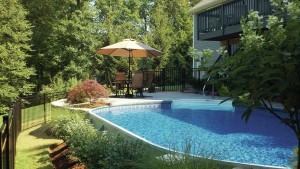Aboveground pool installers working in Connecticut will need to hold a special license. Last month, Gov. Dannel Malloy signed a bill establishing the Above Ground Pool Assembler’s License, which is intended to curb job-site errors.
The law goes into effect April 2016 and joins two other pool-specific licenses in the state — one for builders and the other for service technicians, called SPB and SP1, respectively. The new license will be issued by the commissioner for consumer protection.
House Speaker Brendan Sharkey (D-Hamden) introduced the bill earlier this year in response to concerns raised by a municipal pool inspector who claimed that aboveground installers were violating many codes. Specifically, Sharkey cited the National Electrical Code Article 680, which outlines requirements for hardwiring and bonding, as the most frequently violated code. Officials also were concerned about reported safety barrier violations.
The Above Ground Pool Assembler’s License does not enable holders to perform electrical, piping, plumbing or heating work.
The new law defines an aboveground swimming pool as any structure intended for swimming that is assembled above ground and is greater than 24 inches in depth. Unlicensed aboveground installers could be subject to heavy fines, civil penalties and may even be blacklisted from applying for the license.
It took work for the industry and government to agree on the bill’s language. While well-intended, a previous version of the bill was problematic for pool professionals. When the state’s industry association, CONSPA, caught wind of the effort, its representatives discovered that the original draft would have given certified aboveground installers the authority to also build inground pools, which requires an altogether different skill set.
It also would have required certified builders and service technicians to apply for the aboveground license by taking prerequisite courses and a state exam.
CONSPA worked closely with lawmakers to amend the bill and include an exemption for those who currently hold SPB and SP1 licenses. While they won’t have to take classes and tests, they’ll still need the license to install aboveground pools. It’ll cost $150 initially and $100 to renew every year, said Lawrence Caniglia, executive director of the Northeast Spa & Pool Association, parent organization of CONSPA.
The association also convinced lawmakers to include a grandfather clause for longtime installers. While details have yet to be finalized, Caniglia said applicants likely will be able to prequalify any number of ways, such as supplying letters of recommendation by industry peers, presenting a certificate of good standing from the secretary of the state, proving insurance coverage and inviting inspectors to examine past projects. The clause will sunset in January 2017, at which point all applicants will be subject to an exam and continued education.
Ray Rescildo, chairman of CONSPA’s Government Relations Committee, said this was the first time state legislators introduced a bill without the industry’s input. Fortunately, because the association was already actively engaged with lawmakers, it was made aware of the situation.
“If it wasn’t for the association’s [legislative] efforts over the last 20 years, we could’ve been hit very hard as an industry,” Rescildo said.
CONSPA hopes other industry associations will take a cue from this experience and become involved in the lawmaking process.
“If you’re in a state that doesn’t have a licensure, you should seek it out before it is brought about on someone else’s terms,” Rescildo warned.
The Department of Consumer Protection will provide details on educational requirements by or before April 1, 2016.


